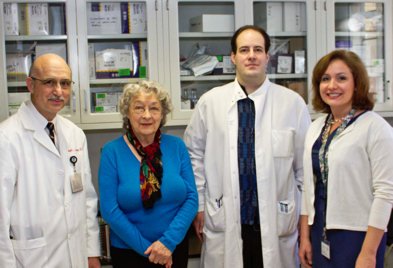Dr. “G” was our speaker at the Annual FACT AIDS Walk in 2010
FACT would like to recognize Dr. Gugliotta’s accomplishments and give him a big FACT congratulations!
(Information as taken from Hunterdon Health Care posting)
Hunterdon Medical Center Infectious Disease Specialist Joseph Gugliotta has helped to identify and successfully treat a new disease, which is transmitted by a deer tick.
Joseph Gugliotta, MD, an Infectious Disease Specialist at Hunterdon Medical Center, was published in the New England Journal of Medicine for his work in identifying and successfully treating the first confirmed North American case of a new disease called Borrelia miyamotoi infection. Dr. Gugliotta treated Kingwood Township resident Anne Felix’s Borrelia miyamotoi, which is transmitted by a deer tick that can infect people with Lyme disease.
Ms. Felix, who has a history of non-Hodgkin’s lymphoma, noticed a change in her mental status and overall function. Over a four-month period, she became increasingly confused, lost 30 pounds, could barely walk without the aid of a cane or walker and withdrew from all activities.
“At first it was thought that she had a reoccurrence of cancer, which led to a spinal tap,” says Dr. Gugliotta. “The spinal tap showed corkscrew bacteria, called a spirochete, in her spinal fluid. It looked similar to Lyme spirochete, but I thought if it were Lyme disease, she would be a lot sicker, due to her age and compromised immune system. I knew from previous studies in Russia that patients [with Borrelia miyamotoi] develop a clinical picture similar to that of Lyme disease.”
Ms. Felix was successfully treated for the new disease with a high dose of penicillin. She has made nearly a full recovery, with the exception of some hearing loss.
“I don’t remember being so sick. I just know it was bad. I am lucky to be alive and thankful for all Dr. Gugliotta did to help me. He saved my life,” she says.
At this time, Imugen Inc., in Norwood, Massachusetts, can test blood samples to determine the presence of this pathogen. The clinical picture (nonspecific fevers) mimics that of the other known tick-borne illnesses; it is likely that in many cases patients are successfully treated without knowing that Borrelia miyamotoi is the culprit.
“We have shown without a doubt that this organism can cause disease. Also, it may be responsible for an illness in a patient who tests negative for Lyme disease. Further research is being conducted on this organism,” explains Dr. Gugliotta.
In addition to Dr. Gugliotta, the report was co-authored by Heidi Goethert, ScD, and Victor Berardi, MS, of Imugen and Sam Telford, ScD, of Tufts University.
Within a few days of receiving the medication, Ms. Felix improved significantly. By the end of a month, she was feeling like herself again and able to enjoy gardening and building a fence with stones.
Dr. Gugliotta has been an Infectious Disease Specialist at Hunterdon Medical Center for 30 years.
Pictured: Joseph Gugliotta, MD; Anne Felix; Anthony Suarez, MLT (ASCP), Senior Laboratory Technician at Hunterdon Medical Center; and Amy Kurynow, MLT (ASCP), Senior Laboratory Technician at Hunterdon Medical Center. Amy and Anthony called attention to the spirochetes during the analysis of the fluid sample from Ms. Felix.

